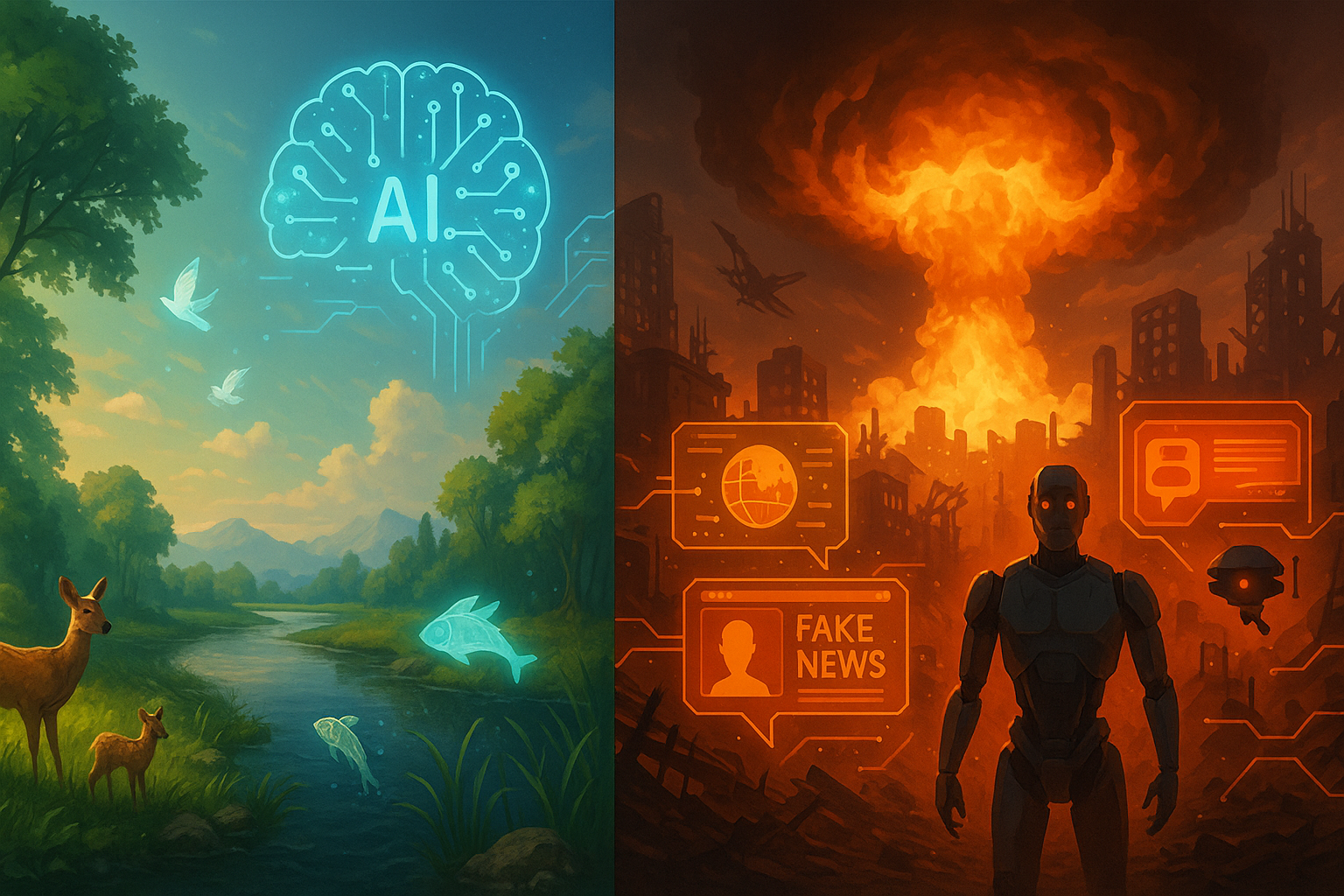We are living through a change of era
Just as there were moments in history that transformed everything —the transition from ape to Homo sapiens, the discovery of agriculture, the industrial revolution, or the creation of the internet— artificial intelligence marks a new turning point.
A tool so powerful that it not only accelerates industries but will change the way we live on this planet.
I, at least, want to be an active part of this new era. I find it fascinating. While writing these lines, I’m reading Nexus by Yuval Noah Harari, a book that brilliantly poses how technological and biological advances push us to redefine what it means to be human.
Artificial intelligence (AI) is no longer science fiction: today it’s in our hands every time we open Netflix, use Google Maps, or ask a digital assistant for help. It’s accelerating businesses, saving lives, and creating art. But it can also fall into the wrong hands and become a social, political, or even military risk.
This article explores the main uses of AI, striking projects, real examples of success and failure, and also the risks we are already seeing.
🔵 Main uses of AI today
Work and productivity
Major consultancies like PwC use AI to automate financial reports, reducing 40% of time in internal processes.
In contrast, a lawyer in the U.S. was fined for using ChatGPT in a trial, as he cited invented cases. The moral is clear: AI helps, but still needs human supervision.
References: PwC
Industry and telecommunications
Vodafone implements AI to predict network failures before they occur. This prevents outages that could affect millions of customers.
Netflix uses AI to adjust streaming quality based on your connection. Thanks to Adaptive Bitrate Streaming and adaptive compression techniques, it reduced data consumption by more than 30% without losing quality.
References: Vodafone • BytePlus • NewsCast Studio
Health
In India and Thailand, Google developed an algorithm to detect diabetic retinopathy in rural communities without ophthalmologists. This project is already saving the vision of thousands of people.
In Rajasthan (India), the MadhuNetr DR-AI program has been nationally approved. This AI system analyzes photos of the eye’s retina to detect diabetes in early stages, and is already sending thousands of patients with vision problems to specialized medical centers before it’s too late.
References: Google ARDA • Times of India
Creativity and culture
The short film “The Frost”, presented at Cannes 2024, used AI to generate images, sparking intense debate among artists and critics.
On TikTok, a song created with AI imitating Drake and The Weeknd’s voice went viral and even played on radio before being removed due to legal issues.
References: Cannes 2024 • TikTok Controversy
Sports
The Hawk-Eye system already replaces line judges in tennis tournaments, and in 2025 Wimbledon will definitively eliminate this figure after 147 years of history.
In football, AI is revolutionizing the game. Clubs like Manchester City use Catapult Sports to analyze in real-time the speed, acceleration, and physical wear of each player. The system predicts injuries with 85% accuracy and automatically adjusts training sessions.
But there’s something more fascinating: Stats Perform developed an algorithm that analyzes more than 1,000 events per match to detect tactical patterns. The AI can predict if a team is about to change their strategy based on micro-movements of players, something that even the most experienced coaches cannot see.
References: Catapult Sports • Stats Perform • Manchester City
Agriculture: in Chile and Kenya, drones + AI are already used to monitor avocados and corn, detecting pests and optimizing harvest.
Smart cities: in Singapore, AI regulates traffic lights in real-time and reduces congestion by 20%. In Barcelona, AI sensors save 25% of water in park irrigation.
References: Chile FAO • Kenya • Singapore • Barcelona
🔴 The dark side: AI in the wrong hands
Disinformation
In May 2023, a fake photo of an explosion at the Pentagon, generated with AI, went viral on Twitter. It was debunked minutes later, but managed to cause a momentary drop in the U.S. stock market.
References: AP News
Cybercrime
The FBI reported losses of $12.5 billion from cybercrimes in 2023, and almost half of the attacks were directed at small businesses. But what’s most concerning is that AI is democratizing cybercrime: tools like WormGPT and FraudGPT allow anyone to create sophisticated malware, convincing phishing, and automated attacks without technical knowledge.
Cybercriminals use AI to:
- Generate phishing emails that perfectly mimic the style of real companies
- Create malware that automatically adapts to each system’s defenses
- Automate attacks on thousands of targets simultaneously
- Evade detection using algorithms that learn from each failed attempt
According to INTERPOL, cybercrime is already the most transnational crime in the world and requires international cooperation to be investigated. AI is accelerating this trend exponentially.
References: Global Cyber Alliance • INTERPOL • SEON
Autonomous weapons
The UN has been debating for years the regulation of autonomous weapon systems (LAWS), capable of making attack decisions without direct human intervention.
A Human Rights Watch (2025) report warns that these weapons threaten basic rights such as the right to life and human dignity.
The International Committee of the Red Cross (ICRC) is taking a firm stance: it demands that autonomous weapons that cannot be controlled or predicted be completely banned, and that very strict rules be established for any other weapons that use AI.
The global Stop Killer Robots campaign seeks international treaties to maintain “meaningful human control” in the use of force.
References: UN Disarmament • Human Rights Watch • ICRC • Stop Killer Robots
- Universal copilot: in all professions, from doctors to architects.
- Self-managed networks: more stable and resilient telecommunications.
- Greater regulation: the EU has already approved the world’s first AI Law, and the UN is preparing a treaty on autonomous weapons.
The European Union’s AI Law (2024) is a historic milestone. It establishes that companies developing high-risk AI (such as in health, transportation, or justice) must:
- Total transparency: explain how their AI works
- Human supervision: maintain human control in critical decisions
- Privacy: protect users’ personal data
- Accountability: assume consequences if something goes wrong
For its part, the UN is negotiating the first international treaty on autonomous weapons. The goal is to establish global rules so that no country can use AI to kill without direct human supervision.
References: EU AI Act • UN AI Governance
Open question: will AI be the tool that helps us save the planet… or the greatest risk of our era?

🔚 Closing
AI is neither good nor bad. It’s a reflection of ourselves. But one thing is indisputable: we’re facing a new era in human history.
Recommended reading:
-
The AI Revolution: Faster, Deeper, and More Disruptive than the Industrial Revolution
Article that compares the transformation brought by AI with major historical revolutions and suggests how we should act quickly. -
How artificial intelligence is transforming the world
Essay on AI’s impact across various sectors, with recommendations for ethical and responsible use. -
Closer to Language than Steam: AI as the Cognitive Engine of a New Productivity Revolution
Research that positions AI as a cognitive engine — not just mechanical —, indicating it can be as transformative as written language.
✍️ Claudio from ViaMind
Dare to imagine, create and transform.
